Boxer
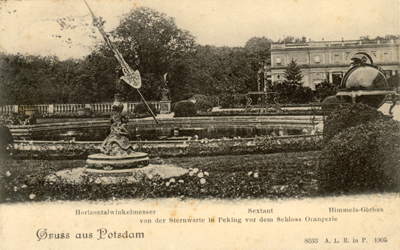
Protokoll
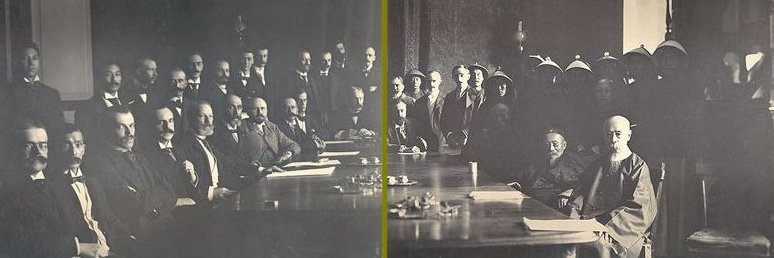
Die Bevollmächtigten der nachfolgenden Staaten: Deutschland, Österreich-Ungarn, Belgien, Spanien, Vereinigte Staaten, Frankreich, Großbritannien, Italien, Japan, Niederlanden, Rußland und China haben die nachfolgende Vereinbarung getroffen, in denen China sich mit den am 22. Dezember 1900 getroffenen Bedingungen einverstanden erklärt, welche am 27. Dezember 1900 durch ein Dekret des Kaisers von China verkündet wurde.
Auszug aus dem sogen. Boxerprotokoll (engl.)
ARTICLE
I
1)
By an Imperial Edict of the 9th June last, ... Prince of the First Rank,
Chun, was appointed Ambassador of His Majesty the Emperor of China, and
directed in that capacity to convey to His Majesty the German Emperor the
expression of the regrets of His Majesty the Emperor of China and of the
Chinese Government at the assassination of his Excellency the late Baron
von Ketteler, German Minister.
Prince Chun left Peking on the 12th July last to carry out the orders
which had been given him.
2) The Chinese Government has stated that it will erect on the spot of the
assassination of his Excellency the late Baron von Ketteler, commemorative
monument worthy of the rank of the deceased, and bearing an inscription in
the Latin, German, and Chinese languages which shall express the regrets
of His Majesty the Emperor of China for the murder committed.
The Chinese Plenipotentiaries have informed his Excellency the German
Plenipotentiary, in a letter dated the 22nd July last, that an arch of the
whole width of the street would be erected on the said spot, and that work
on it was begun on the 25th June last.
ARTICLE
II
1) Imperial Edicts of the 13th and 21st
February, 1901, inflicted the following punishments on the principal
authors of the attempts and of the crimes committed against the foreign
Governments and their nationals:
-
Tsa-Ii, Prince Tuan, and Tsai-Lan, Duke Fu-kuo, were sentenced to be
brought before the Autumnal Court of Assize for execution, and it was
agreed that if the Emperor saw fit to grant them their lives, they should
be exiled to Turkestan, and there imprisoned for life, without the
possibility of commutation of these punishments.
- Tsai Hsun, Prince Chuang, Ying-Nien, President of the Court of Censors,
and Chao Shu- chiao, President of the Board of Punishments, were condemned
to commit suicide.
- Yu Hsun, Governor of Shansi, Chi Hsiu, President of the Board of Rites,
and Hsu Cheng-yu, formerly Senior Vice-President of the Board of
Punishments, were condemned to death.
- Posthumous degradation was inflicted on Kang Yi, Assistant Grand
Secretary, President of the Board of Works, Hsu Tung, Grand Secretary, and
Li Ping-heng, former Governor- General of Szu-chuan.
Imperial Edict of the 13th February last rehabilitated the memories of Hsu
Yung-yi, President of the Board of War; Li Shan, President of the Board of
Works; Hsu Ching Cheng, Senior VicePresident of the Board of Civil Office;
Lien Yuan, Vice-Chancellor of the Grand Council; and Yuan Chang,
Vice-President of the Court of Sacrifices, who had been put to death for
having protested against the outrageous breaches of international law of
last year.
Prince Chuang committed suicide on the 21st February last; Ying Nien and
Chao Shu- chiao on the 24th February; Yu Hsien was executed on the 22nd
February; Chi Hsiu and Hsu Cheng-yu on the 26th February; Tung Fu-hsiang,
General in Kan-su, has been deprived of his office by Imperial Edict of
the 13th February last, pending the determination of the final punishment
to be inflicted on him.
Imperial Edicts, dated the 29th April and 19th August, 1901, have
inflicted various punishments on the provincial officials convicted of the
crimes and outrages of last summer.
2) An Imperial Edict, promulgated the 19th August, 1901, ordered the
suspension of official examinations for five years in all cities where
foreigners were massacred or submitted to cruel treatment.
ARTICLE
III
So
as to make honourable reparation for the assassination of Mr. Sugiyama,
Chancellor of the Japanese Legation, His Majesty the Emperor of China, by
an Imperial Edict of the 18th June, 1901, appointed Na T'ung,
Vice-President of the Board of Finances, to be his Envoy Extraordinary,
and specially directed him to convey to His Majesty the Emperor of Japan
the expression of the regrets of His Majesty the Emperor of China and of
his Government at the assassination of Mr. Sugiyama.
ARTICLE
IV
The
Chinese Government has agreed to erect an expiatory monument in each of
the foreign or international cemeteries which were desecrated, and in
which the tombs were destroyed.
It has been agreed with the Representatives of the Powers that the
Legations interested shall settle the details for the erection of these
monuments, China bearing all the expenses thereof, estimated at 10,000
taels, for the cemeteries at Peking and in its neighbourhood, and at 5,000
taels for the cemeteries in the provinces. The amounts have been paid, and
the list of these cemeteries is inclosed herewith.
ARTICLE
V
China
has agreed to prohibit the importation into its territory of arms and
ammunition, as well as of materials exclusively used for the manufacture
of arms and ammunition.
An Imperial Edict has been issued on the 25th August, forbidding said
importation for a term of two years. New Edicts may be issued subsequently
extending this by other successive terms of two years in case of necessity
recognized by the Powers.
ARTICLE
VI
By
an Imperial Edict dated the 29th May, 1901, His Majesty the Emperor of
China agreed to pay the Powers an indemnity of 450,000,000 of Haikwan
taels. This sum represents the total amount of the indemnities for States,
Companies, or Societies, private individuals and Chinese, referred to in
Article 6 of the note of the 22nd December,1900.
1) These 450,000,000 constitute a gold debt calculated at the rate of the
Haikwan tael to the gold currency of each country (335million gold dollars,
etc.)…
This
sum in gold shall shall bear interest at 4 per cent. per annum, and the
capital shall be reimbursed by China in thirty-nine years in the manner
indicated in the annexed plan of amortization. Capital and interest shall
be payable in gold or at the rates of exchange corresponding to the dates
at which the different payments fall due.
The amortization shall commence the 1st January, I902, and shall finish at
the end of the year I940. The amortizations are payable annually, the
first payment being fixed on the 1st January, 1903.
Interest shall run from the 1st July, 1901, but the Chinese Government
shall have the right to pay off within a term of three years, beginning
January 1902, the arrears of the first six months ending the 31st December,
1901, on condition, however, that it pays compound interest at the rate of
4 per cent. a year on the sums the payment of which shall have been thus
deferred.
Interest shall be payable semi-annually, the first payment being fixed on
the 1st July, I902.
2)
The service of the debt shall take place in Shanghai in the following
manner:
Each Power shall be represented by a Delegate on a Commission of bankers
authorized to receive the amount of interest and amortization which shall
be paid to it by the Chinese authorities designated for that purpose, to
divide it among the interested parties, and to give a receipt for the same.
3)
The Chinese Government shall deliver to the Doyen of the Diplomatic Corps
at Peking a bond for the lump sum, which shall subsequently be converted
into fractional bonds bearing the signature of the Delegates of the
Chinese Government designated for that purpose. This operation and all
those relating to issuing of the bonds shall be performed by the above
mentioned Commission, in accordance with the instructions which the Powers
shall send their Delegates.
4)
The proceeds of the revenues assigned to the payment of the bonds shall be
paid monthly to the Commission.
5)
The seven assigned as security for the bonds are the following:
a) The balance of the revenues of the Imperial Maritime Customs, after
payment of the interest and amortization of preceding loans secured on
these revenues, plus the proceeds of the raising to 5 per cent. effective
of the present tariff of maritime imports, including articles until now on
the free list, but exempting rice, foreign cereals, and flour, gold and
silver bullion and coin.
b) The revenues of the native Customs, administered in the open ports by
the Imperial Maritime Customs.
c) The total revenues of the salt gabelle, exclusive of the fraction
previously set aside for other foreign loans.
6)
The raising of the present tariff on imports to 5 per cent. effective is
agreed to on the conditions mentioned below. It shall be put in force two
months after the signing of the present Protocol, and no exceptions shall
be made except for merchandize in transit not more than ten days after the
said signing…
b) The beds of the Rivers Whangpoo and Peiho shall be improved with the
financial participation of China.
ARTICLE
VII
The
Chinese Government has agreed that the quarter occupied by the Legations
shall be considered as one specially reserved for their use and placed
under their exclusive control, in which Chinese shall not have the right
to reside, and which may be made defensible…
In the Protocol annexed to the letter of the 16th January, 1901, China
recognized the right of each Power to maintain a permanent guard in the
said quarter for the defence of its Legation.
ARTICLE
VIII
The
Chinese Government has consented to raze the forts of Taku, and those
which might impede free communication between Peking and the sea. Steps
have been taken for carrying this out.
ARTICLE
IX
The
Chinese Government conceded the right to the Powers in the Protocol
annexed to the letter of the i6th January, 1901, to occupy certain points,
to be determined by an Agreement between them for the maintenance of open
communication between the capital and the sea. The points occupied by the
Powers are:
Huang-tsun, Lang-fang, Yang-tsun, Tien-tsin, Chun-liang-Cheng, Tong-ku,
Lu-tai, Tong- shan, Lan-chou, Chang-li, Chin-wang Tao, Shan-hai Kuan.
ARTICLE
X
The
Chinese Government has agreed to post and to have published during two
years in all district cities the following Imperial Edicts:
1) Edict of the 1st February, 1901, prohibiting for ever under pain of
death, membership in any anti-foreign society.
2) Edicts of the 13th and 21st February, 29th April and 19th August, 1901,
enumerating the punishments inflicted on the guilty.
3) Edict of the 19th August, 1901, prohibiting examinations in all cities
where foreigners were massacred or subjected to cruel treatment.
4) Edicts of the 1st February, 1901, declaring all GovernorsGeneral,
Governors, and provincial or local officials responsible for order in
their respective districts, and that in case of new anti-foreign troubles
or other infractions of the Treaties which shall not be immediately
repressed and the authors of which shall not have been punished, these
officials shall be immediately dismissed without possibility of being
given new functions or new honours.
The posting of these Edicts is being carried on throughout the Empire.
ARTICLE
XI
The
Chinese Government has agreed to negotiate the amendments deemed necessary
by the foreign Governments to the Treaties of Commerce and Navigation and
the other subjects concerning commercial relations with the object of
facilitating them.
At present, and as a result of the stipulation contained in Article 6
concerning the indemnity, the Chinese Government agrees to assist in the
improvement of the courses of the Rivers Peiho and Whangpoo, as stated
below.
1) The works for the improvement of the navigability of the Peiho, begun
in 1898 with the co-operation of the Chinese Government, have been resumed
under the direction of an International Commission. As soon as the
Administration of Tien-tsin shall have been handed back to the Chinese
Government it will be in a position to be represented on this Commission,
and will pay each year a sum of 60,000 Haikwan taels for maintaining the
works.
2)
A Conservancy Board, charged with the management and control of the works
for straightening the Whangpoo and the improvement of the course of that
river, is hereby created.
The Board shall consist of members representing the interests of the
Chinese Government and those of foreigners in the shipping trade of
Shanghai.
The expenses incurred for the works and the general management of the
undertaking are estimated at the annual sum of 460,000 Haikwan taels for
the first twenty years. This sum shall be supplied in equal portions by
the Chinese Government and the foreign interests concerned.
ARTICLE XII
An
Imperial Edict of the 24th July, 1901, reformed the Office of Foreign
Affairs, Tsung- li Yamen, on the lines indicated by the Powers, that is to
say, transformed it into a Ministry of Foreign Affairs, Wai Wu Pu, which
takes precedence over the six other Ministries of State; the same Edict
appointed the principal Members of this Ministry.
An agreement has also been reached concerning the modification of Court
ceremonial as regards the reception of foreign Representatives, and has
been the subject of several notes from the Chinese Plenipotentiaries, the
substance of which is embodied in a Memorandum herewith annexed.
Finally, it is expressly understood that as regards the declarations
specified above and the annexed documents originating with the foreign
Plenipotentiaries, the French text only is authoritative.
The Chinese Government having thus complied to the satisfaction of the
Powers with the conditions laid down in the above-mentioned note of the
22nd December, 1900, the Powers have agreed to accede to the wish of China
to terminate the situation created by the disorders of the summer of 1900.
In consequence thereof, the foreign Plenipotentiaries are authorized to
declare in the names of their Governments that, with the exception of the
Legation guards mentioned in Article VII, the international troops will
completely evacuate the city of Peking on the 7th September, 1901, and,
with the exception of the localities mentioned in Article IX, will
withdraw from the Province of Chihli on the 22nd September, 1901.
Dieses abschließende Protokoll wurde in zwölf identischen Kopien angefertigt und von allen Bevollmächtigten unterzeichnet.
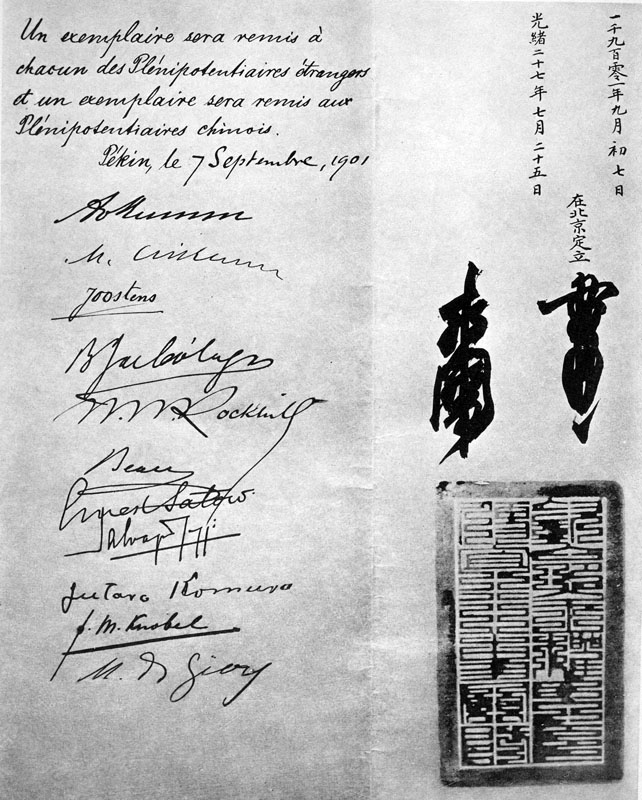
Reise der Sühnedelegation
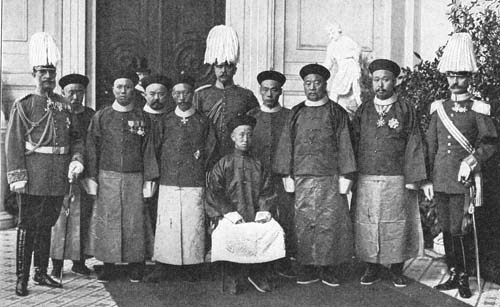
v.l.n.r. Generalmajor v. Höpfner (Kommandeur der
III. ostasiatischen Infanteriebrigade), Wankuan (Sekretär), Dr. George
Mark (Legationssekretär), Liusokuei (Sekretär), Yintschang
(Bannergeneral, neuernannter Gesandter für Berlin), Generalmajor Richter
(Kommandeur der 17. Infanteriebrigade), Seine kaiserliche Hoheit Prinz
Tschun, Tschiko (Dolmetscher), Tschangyinmau (Vizepräsident eines
Ministeriums und Legationssekretär, Liangtscheng (genannt Sir Tschuntung,
Legationssekretär), Frhr. v. Lüttwitz (Major im Generalstab des
Gardekorps)
Kaiser Wilhelm II. antwortete darauf wie folgt: "Nicht ein heiterer, festlicher Anlass noch die Erfüllung einer einfachen Höflichkeitspflicht haben Ew. Kaiserliche Hoheit zu Mir geführt, sondern ein tieftrauriger und hochernster Vorfall. Mein Gesandter am Hofe Seiner Majestät des Kaisers von China, Freiherr von Ketteler, ist der auf höheren Befehl erhobenen Mordwaffe eines Kaiserlich chinesischen Soldaten in der Hauptstadt Chinas erlegen, ein unerhörtes Verbrechen, welches durch Völkerrecht und Sitte aller Nationen gleich sehr gebrandmarkt wird. Aus Eurer Kaiserlichen Hoheit Munde habe ich soeben den Ausdruck des aufrichtigen und tiefen Bedauerns Seiner Majestät des Kaisers von China über das Vorkommnis vernommen. Ich will gern glauben, dass Eurer Kaiserlichen Hoheit Kaiserlicher Bruder persönlich dem Verbrechen und den weiteren Gewalttaten gegen unverletzliche Gesandtschaften und friedliche Fremde fern gestanden hat. Um so schwerere Schuld trifft Seine Ratgeber und Seine Regierung. Diese mögen sich nicht darüber täuschen, dass ihnen Entsühnung und Verzeihung für ihr Verschulden nicht durch die Sühnegesandtschaft allein ausgewirkt werden kann, sondern nur durch ihr späteres Verhalten gemäß den Vorschriften des Völkerrechts und der Sitte civilisierter Nationen. Wein Seine Majestät der Kaiser von China die Regierung Seines großen Reiches fürderhin streng im Geiste dieser Vorschriften führt, wird auch Seine Hoffnung sich erfüllen, dass die trüben Folgen der Wirrsale des vergangenen Jahres überwunden werden und zwischen Deutschland und China wieder wie früher dauernd friedliche und freundliche Beziehungen herrschen, die den beiden Völkern und der gesamten menschlichen Civilisation zum Segen gereichen. In dem aufrichtigen und ernsten Wunsche, dass dem so sein möge, heiße ich Eure Kaiserliche Hoheit willkommen.
Handschreiben des Kaisers von China: "Der Großkaiser des Tatsing-Reiches entbietet seiner Majestät dem Großen Deutschen Kaiser Gruß. Seitdem Unsere Reiche gegenseitig durch ständige Gesandtschaften vertreten sind, haben wir ununterbrochen in den freundschaftlichsten Beziehungen zu einander gestanden.
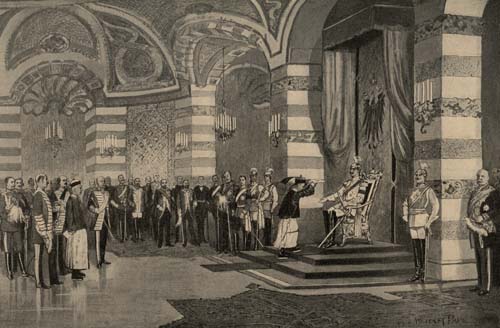
[Nach einer Zeichnung von William Pape]
Am 04. September 1901 überreichte Prinz Tuan Kaiser Wilhelm II. im
neuen Palais zu Potsdam den Sühnebrief